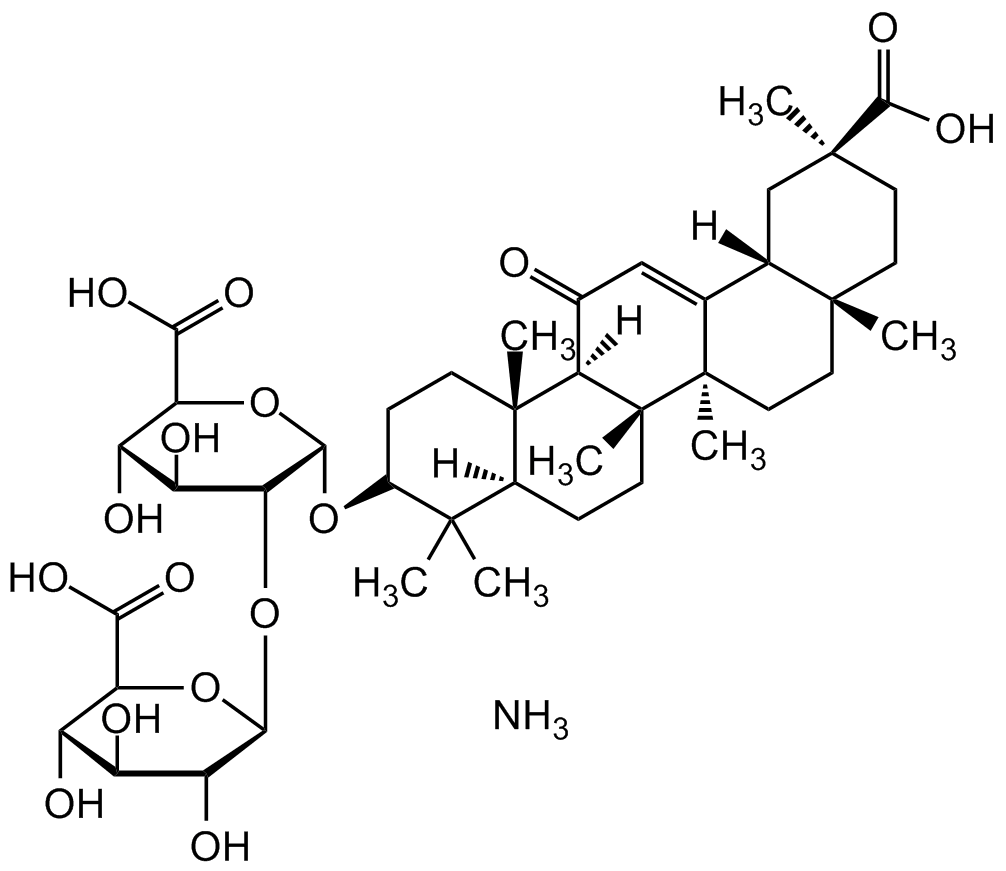
Chemical Structure
Glycyrrhizic acid ammonium salt [53956-04-0]
CDX-G0215
CAS Number53956-04-0
Product group Chemicals
Estimated Purity>98%
Molecular Weight839.96
Overview
- SupplierChemodex
- Product NameGlycyrrhizic acid ammonium salt [53956-04-0]
- Delivery Days Customer2
- CAS Number53956-04-0
- CertificationResearch Use Only
- Estimated Purity>98%
- Molecular FormulaC42H62O16 . NH3
- Molecular Weight839.96
- Scientific DescriptionChemical. CAS: 53956-04-0. Formula: C42H62O16 . NH3. MW: 839.96. Glycyrrhizic acid is a natural triterpenoid saponin. It is an agonist of the human sweet taste receptor and is used as a flavorant. Glycyrrhizic acid has diverse biological activities, including antioxidant, anti-inflammatory, antidiabetic, anticancer, antimicrobial, hepatoprotective, neuroprotective and antiviral actions. Glycyrrhizic acid has been shown to be a 11-beta-hydroxysteroid dehydrogenase inhibitor, a functional inhibitor of HMGB1 and a highly selective and competitive inhibitor of kynurenine aminotransferase 2 (KAT2). It can enhance GLP-1 secretion through TGR5 activation and has an anti-inflammatory effect by attenuating the generation of excessive NO, PGE(2), and ROS and by suppressing the expression of pro-inflammatory genes through the inhibition of NF-kappa and PI3K activity. It has anti-angiogenic and apoptosis inducing properties. In addition, due to its amphiphilic nature glycyrrhizic acid is able to form self-associates in aqueous and non-aqueous media, as well as water soluble complexes with a wide range of lipophilic drugs. It has been identified as promising carrier material for anticancer therapy, due to its anti-cancer-related pharmacological activities, such as broad-spectrum anti-cancer ability, resistance to the tissue toxicity caused by chemotherapy and radiation, drug absorption enhancing effects and anti-multidrug resistance (MDR) mechanisms. - Glycyrrhizic acid is a natural triterpenoid saponin. It is an agonist of the human sweet taste receptor and is used as a flavorant. Glycyrrhizic acid has diverse biological activities, including antioxidant, anti-inflammatory, antidiabetic, anticancer, antimicrobial, hepatoprotective, neuroprotective and antiviral actions. Glycyrrhizic acid has been shown to be a 11-beta-hydroxysteroid dehydrogenase inhibitor, a functional inhibitor of HMGB1 and a highly selective and competitive inhibitor of kynurenine aminotransferase 2 (KAT2). It can enhance GLP-1 secretion through TGR5 activation and has an anti-inflammatory effect by attenuating the generation of excessive NO, PGE(2), and ROS and by suppressing the expression of pro-inflammatory genes through the inhibition of NF-kappa and PI3K activity. It has anti-angiogenic and apoptosis inducing properties. In addition, due to its amphiphilic nature glycyrrhizic acid is able to form self-associates in aqueous and non-aqueous media, as well as water soluble complexes with a wide range of lipophilic drugs. It has been identified as promising carrier material for anticancer therapy, due to its anti-cancer-related pharmacological activities, such as broad-spectrum anti-cancer ability, resistance to the tissue toxicity caused by chemotherapy and radiation, drug absorption enhancing effects and anti-multidrug resistance (MDR) mechanisms.
- SMILESO=C(O)[C@@H]1[C@@H](O)[C@H](O)[C@@H](O)[C@H](O[C@@H]2[C@@H](O)[C@H](O)[C@@H](C(O)=O)O[C@@H]2O[C@H]3C(C)(C)[C@@](CC[C@]([C@@](CC[C@]4(C)[C@@]5([H])C[C@@](C)(C(O)=O)CC4)(C)C5=C6)(C)[C@]7([H])C6=O)([H])[C@]7(C)CC3)O1.N
- Storage Instruction2°C to 8°C,RT
- UNSPSC12352200

![Ammonium glycyrrhizinate [53956-04-0]](https://www.targetmol.com/group3/M00/3F/20/CgoaEGbgCiyEJBBIAAAAAFd4yZA910.png)